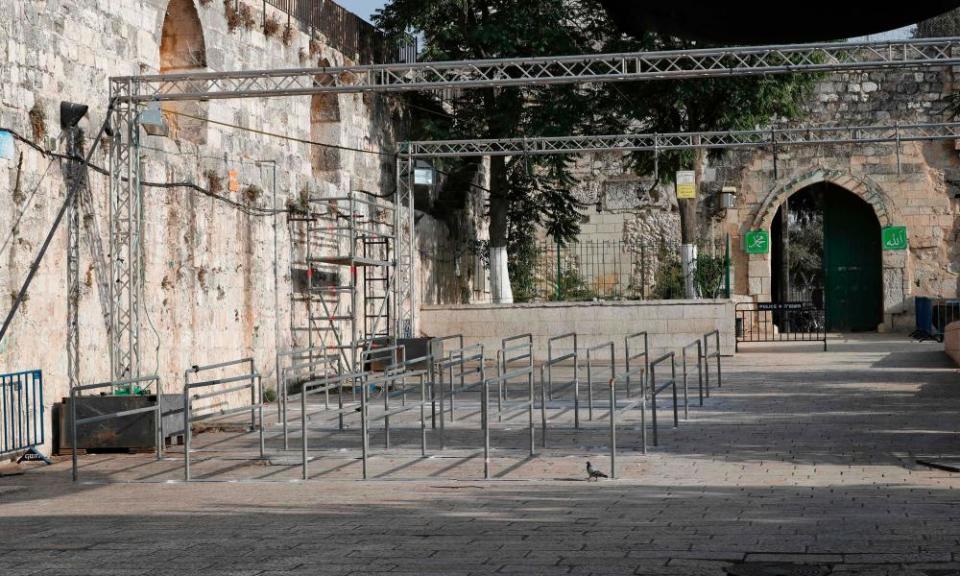Muslim worshippers to continue boycott of al-Aqsa mosque compound

Muslim worshippers in Jerusalem appear likely to maintain a boycott on the compound housing al-Aqsa mosque, with the Palestinian president, Mahmoud Abbas, saying he will maintain a freeze on coordination with Israel even after it dismantled controversial metal detectors that triggered more than a week of violent conflict.
“Unless all measures go back to what they were before 14 July, there will not be any changes,” Abbas said in a speech before a meeting with the Palestinian leadership. Security was increased after the 14 July attack at the compound in which two Israeli police officers were killed by three Israeli Arab gunmen, who later died in a shootout.
Fresh clashes broke out after the second evening prayers had finished late on Tuesday, with police using volleys of stun grenades to clear the streets, further undermining hopes of a peaceful resolution to the crisis.
The protests, during which worshippers have prayed in the streets around the compound, come amid concern that Israel is still seeking to impose enhanced security measures at the site, despite the removal of the devices.
Noisy crowds gathered outside the compound for evening prayers in an atmosphere that veered between celebration, empowerment and defiance.
The tensions came as clerics said they needed more time to study the proposed Israeli measures, which Palestinian and other critics say are in breach of the status quo governing the compound known to Muslims as the Haram al-Sharif and revered by Jews as the Temple Mount.
“We need to know all the details before we decide to pray inside the compound,” said Muhammad Hussein, the grand mufti of Jerusalem, the city’s top Muslim cleric.
Jordan, which is custodian of the site under the status quo, echoed the message on Tuesday saying it wanted a return to security conditions before 14 July.
The move to install the metal detectors after that attack set off widespread protests and deadly Israeli-Palestinian violence over the past week.

However, in a late night announcement in the early hours of Tuesday, Israel said it would replace the metal detectors with other security arrangements based on “advanced technology”.
The crisis over the religious site that has occurred over the last 10 days has also revealed how in the Israeli-Palestinian conflict religious tensions are increasingly coming to the fore.
The question now, however, is whether the decision to remove the metal detectors and some cameras after such a tense period is enough to put a lid on the latest violence.
Recent experience suggests that while such confrontations are easy to provoke they are far less simple to defuse, amid reports in the Hebrew media that Israeli police will once again turn out in force for this week’s Friday prayers – making the day a key test of whether protests will continue.
The most recent wave of stabbings and attacks by Palestinians, which had largely abated, were provoked by exactly the same concerns among Palestinians that Israel was trying to extend its control over the religious site, while the second intifada in 2000 was triggered by a high-profile visit to the compound by the then Israeli opposition leader, Ariel Sharon – both of which led to prolonged periods of violence.
The mishandling of the current crisis by the beleaguered Israeli prime minister, Benjamin Netanyahu, has drawn attention once again to the volatile dynamics of his far-right coalition, not least his tendency to bend to far-right national religious politicians such as the education minister, Naftali Bennett, for fear of being outflanked on his right.
Among those who harshly criticised Netanyahu’s handling of the crisis on Tuesday was the former Israeli prime minister Ehud Barak, who accused the government of “haste and immaturity”.
On the Palestinian side different forces have been in play.
While Abbas suspended all contacts with Israel over the crisis – including security contacts – the protests over the metal detectors and al-Aqsa mosque have been driven by a grassroots public sentiment largely outside the Palestinian political factions which the unpopular Abbas can ill afford to ignore.
Organised at a local level in the East Jerusalem neighbourhoods, it saw protesters quickly organise, raising money to provide food and drinks at the nightly protests at the Lions’ Gate entrance to the esplanade which is the site of al-Aqsa mosque.
“This movement is a movement of the street,” said Sheikh Raed Dana of the Waqf, the Islamic endowment organisation which administers the mosque compound.
“We as the Waqf listen to the street. The street says yes and we say yes; if the street says no to the measures, we will say no.”
Outside the compound on Tuesday evening, worshippers insisted they would not enter the mosque.
“Everyone has come here to protest,” said Fadel Abu Ramouz, 48. “We don’t want Israeli cameras or any other measures and will stay outside the mosque until they do.”
Jawad al-Siyam, a well-known activist from the Silwan neighbourhood in East Jerusalem, offered a more nuanced interpretation, suggesting that after the removal of the cameras some people wanted to return to praying in the mosque while others wanted to continue until all the new security measures had been removed.
“People want to stay in the streets until Israel removes everything that it brought.” Siyam noted that another significance of the protest movement that has grown up in recent days had been it ability to unify Palestinians.
“Palestinians can disagree about everything but not about al-Aqsa. They consider what is happening here a violation. Even people who do not have much money have been contributing to buy food and drinks for this protest.”

 Yahoo News
Yahoo News 
